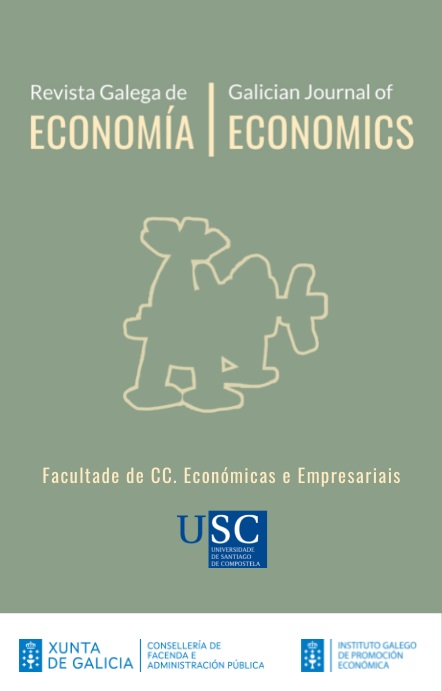Como afectan as empresas zombis ás empresas sas: O caso do sector comercial portugués
Contido principal do artigo
Resumo
As empresas zombis poden clasificarse como non rendibles, con baixa produtividade e con dez anos ou máis de antigüidade; estas empresas seguen existindo grazas ao apoio dos bancos e os gobernos. Este traballo pretende coñecer o impacto deste tipo de empresas no investimento, o crecemento do emprego e a produtividade laboral das empresas sas do comercio maiorista e minorista e do sector da hostalería durante o período 2011-2018. Os datos obtidos indican que a prevalencia das empresas zombis en Portugal (nos sectores obxecto de estudo) é maior en períodos de crise económica e que a maioría delas son empresas antigas e de gran tamaño, especialmente no sector da hostalería. Mediante o uso de modelos de datos de panel con efectos fixos, a nosa investigación conclúe que as empresas zombi afectan negativamente á xestión das empresas sas, xa que reducen o gasto de investimento e a produtividade da man de obra destas últimas.
Palavras-chave:
Detalles do artigo
Referências
Aherne, A. & Shinada, N. (2005). Zombie firms and economic stagnation in Japan. International Economics and Economic Policy, 2, 363–381. https://doi.org/10.1007/s10368-005-0041-1
Alexandre, F., Bação, P., Carreira, C., Cerejeira, J., Loureiro, G., Martins, A. & Portela, M. (2017). O financiamento do investimento. In Fernando Alexandre (Ed.) Investimento empresarial e o crescimento da economia portuguesa (pp. 60-76). Fundação Calouste Gulbenkian. http://hdl.handle.net/1822/54674
Andrews, D. & Petroulakis, F. (2019). Breaking the shackles: Zombie firms, weak banks and depressed restructuring in Europe. Working Paper Series, European Central Bank. Nº. 2240. https://EconPapers.repec.org/RePEc:ecb:ecbwps:20192240
Banerjee, R. & Hofmann, B. (2018). The rise of zombie firms: causes and consequences. BIS Quarterly Review, 67-78. https://www.bis.org/publ/qtrpdf/r_qt1809g.pdf
Bank of Portugal (2021). Economic and Financial Assistance Programme. https://www.bportugal.pt/page/programa-de-assistencia-economica-e-financeira
Barros, G., Caires, F. & Pereira, D. (2017). Empresas zombie em Portugal - Os sectores não transacionáveis da construção e dos serviços. GEE Papers (88) 1-22. https://www.researchgate.net/publication/352180414_GEE_Papers_88
Blanchard, O. & Portugal, P. (2017). Boom, slump, sudden stops, recovery, and policy options: Portugal and the Euro. Peterson Institute for International Economics. Working Paper 17-8.
Caballero, R., Hoshi, T. & Kashyap, A. (2008). Zombie lending and depressed restructuring in Japan. American Economic Review, 98(5), 1943-1977. https://doi.org/10.1257/aer.98.5.1943
Chang, Q., Zhou, Y, Liu, G., Wang, D. & Zhang, X. (2020). How does government intervention affect the formation of zombie firms? Economic Modelling, 94, 768-779. https://doi.org/10.1016/j.econmod.2020.02.017
Dai, X., Qiao, X. & Song, L. (2019). Zombie firms in China's coal mining sector: Identification, transition determinants and policy implications. Resources Policy, 62, 664-673. https://doi.org/10.1016/j.resourpol.2018.11.016
El Ghoul, S., Fu, Z. & Guedhami, O. (2021). Zombie firms: Prevalence, determinants, and corporate policies. Finance Research Letters, 41, (10186). https://doi.org/10.1016/j.frl.2020.101876
Fukuda, S.I. & Nakamura, J.I. (2011). Why did `zombie´ firms recover in Japan? The World Economy, 34 (7), 1124-1137. http://dx.doi.org/10.1111/j.1467-9701.2011.01368.x
Gouveia, A.F. & Osterhold, C. (2018). Fear the walking dead: Zombie firms, spillovers and exit barriers. Productivity Working Papers No. 13, OECD. https://doi.org/10.1787/e6c6e51d-en
Gouveia, A.F. & Osterhold, C. (2019). Estarão as empresas zombie a limitar o crescimento das empresas viáveis? In O crescimento económico português: uma visão sobre questões estruturais, bloqueios e reformas (pp. 195-204). Departamento de Estudos Económicos, Banco de Portugal. https://www.bportugal.pt/sites/default/files/anexos/pdf-boletim/cep_pt.pdf
Hallak, I., Harasztosi, P. & Schich, S. (2018). Fear the walking dead? Incidence and effects of zombie firms in Europe. Journal of Economic Science Research, 1(1): 24-40. https://doi.org/10.30564/jesr.v1i1.393
Han, S., Li, G., Lubrano, M. & Xun, Z. (2020). Lie of the weak: Inconsistent corporate social responsibility activities of Chinese zombie firms. Journal of Cleaner Production, 253, 1-17. https://doi.org/10.1016/j.jclepro.2019.119858
Hoshi, T. & Kashyap, A. (2000). The Japanese Banking Crisis: Where did it come from and how will it end? NBER Macroeconomics Annual 1999, Volume 14, Bernanke and Rotemberg.
Imai, K. (2016). A panel study of zombie SMEs in Japan: Identification, borrowing and investment behavior. Journal of the Japanese and International Economies, 39, 91-107. https://doi.org/10.1016/j.jjie.2015.12.001
Jiang, X., Li, S. & Song, X. (2017). The mystery of zombie enterprises - ‘‘stiff but deathless”. China Journal of Accounting Research, 10(4), 341-357. https://doi.org/10.1016/j.cjar.2017.08.001
Karmakar, S. (2019). Que importância tem o acesso ao financiamento para o desempenho das empresas em períodos de crise? O crescimento económico português: uma visão sobre questões estruturais, bloqueios e reformas (pp. 147-155). Departamento de Estudos Económicos, Banco de Portugal. https://www.bportugal.pt/sites/default/files/anexos/pdf-boletim/cep_pt.pdf
Leão, J., Martins, A. & Gonçalves, J. (2014). Crescimento económico e financiamento da economia portuguesa: um obstáculo ao crescimento? GEE Papers, (52), 1-18. https://www.gee.gov.pt/RePEc/WorkingPapers/GEE_PAPERS_52.pdf
Liu, G., Zhang, X., Zhang, W. & Wang, D. (2019). The impact of government subsidies on the capacity utilization of zombie firms. Economic Modelling, 83, 51-64. https://doi.org/10.1016/j.econmod.2019.09.034
McGowan, M., Andrews, D. & Millot, V. (2017). The walking dead? Zombie firms and productivity performance in OECD countries. Economics Department Working Papers Nº. 1372, OECD. https://doi.org/10.1787/180d80ad-en
National Statistics Institute (2021). [Web site] Accommodation and Restaurant Statistics: 2011-2018. www.ine.pt
Peek, J. & Rosengren, E. (2005). Unnatural selection: Perverse incentives and the misallocation of Credit in Japan. American Economic Review, 95(4), 1144-1166. https://doi.org/10.1257/0002828054825691
Schivardi, F., Sette, E. & Tabellini, G. (2020). Identifying the real effects of zombie lending. The Review of Corporate Finance Studies, 9(3), 569–592. https://doi.org/10.1093/rcfs/cfaa010
Shen, G. & Chen, B. (2017). Zombie firms and over-capacity in Chinese manufacturing. China Economic Review, 44, 327-342. https://doi.org/10.1016/j.chieco.2017.05.008
Tan, Y., Huang, Y., & Woo, W. (2016). Zombie Firms and the Crowding-Out of Private Investment in China. Asian Economic Papers, 15(3), 32-55. https://doi.org/10.1162/ASEP_a_00474
Turismo de Portugal (2020). Turismo em Portugal. https://travelbi.turismodeportugal.pt/turismo-em-portugal/turismo-em-portugal-2020/
Urionabarrenetxea, S., Merino, J.D.G., Jose, L.S. & Retolaza, J.L. (2018). Living with zombie companies: Do we know where the threat lies? European Management Journal, 36(3), 408-420. https://doi.org/10.1016/j.emj.2017.05.005
Vaz (2021). Firm growth: A review of the empirical literature. Revista Galega de Economía, 30(2), 1-20. http://dx.doi.org/10.15304/rge.30.2.7190
Wang, Y. & Zhu, Y. (2021). The financing and investment crowding-out effect of zombie firms on non-zombie firms: Evidence from China. Emerging Markets Finance and Trade, 57(7), 1959-1985. https://doi.org/10.1080/1540496X.2019.1711370
Yu, M., Guo, Y.M., Wang, D. & Gao, X. (2021). How do zombie firms affect debt financing costs of others: From spillover effects views. Pacific-Basin Finance Journal, 65, 1-15. https://doi.org/10.1016/j.pacfin.2020.101471







